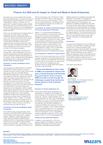Finance Act 2020 and Its Impact on Small and Medium Scale Enterprises
One major focus of the President Muhammadu Buhari led administration is to improve the ease of doing business and encourage the tax and fiscal responsibility in Nigeria. To achieve this, the government has over the last two years, through the Finance Act 2019 and 2020 (FA 2019 & FA 2020) amended various tax and fiscal legislations to align the Nigerian business environment with global standards.
One of such amendments is the categorization of companies into small, medium, and large companies, based on annual gross turnover as seen in the Finance Act 2019 (FA 2019). Small companies are companies with annual gross turnover below N25 million; medium size companies have annual gross turnover of N25 million and above but below N100 million, while large companies are those with annual gross turnover of N100 million and above.
The Finance Act 2020 which took effect from 1 January 2021, made amendments to some tax and fiscal legislations by granting additional tax reliefs to small and medium scale companies.
Definition of Small and Medium Scale Companies
The Companies and Allied Matters Act (CAMA) 2020 defines a small company as a private company having an annual turnover and net asset value of not more than N120,000,000 and N60,000,000 respectively, it has no foreigner as its member and where the company has a share capital, the directors hold at least 51% of the share capital. This definition is at variance with the definition provided in the Finance Act 2019. Consequently, the FA 2020 has now provided amendments to resolve the controversy that arose with CAMA 2020 as small and medium size companies are now required to submit a special type of account along with their tax returns. The CAMA 2020 threshold for small and medium scale companies will also cover some companies classified as medium size companies (whose annual gross turnover does not exceed N100 million) based on CITA. However, for medium scale companies whose annual gross turnover falls between N100 million and N120 million, it is not yet clear the form of accounts that will be submitted along with their tax returns.
Tax Returns by Small and Medium Scale Companies
In line with the ease of doing business and in accordance with CAMA 2020, small companies were exempt from the requirement to appoint auditors. Effectively, small companies are no longer required to prepare audited financial statements which is a requirement for filing annual corporate tax returns with the Federal Inland Revenue Service (FIRS). Consequently, the FA 2020 introduced an amendment to Section 55 of CITA by introducing a new Sub-Section 7 which empowers the FIRS to issue a notice specifying the forms of accounts to be included in the tax returns of small companies. This implies that the cost of engaging the services of an auditor has been eliminated for SMEs.
Tax Holiday for Small Companies Engaged in Primary Agricultural Production
Section 1 (7) of the Industrial Development (Income Tax Relief) Act now grants an initial tax-free period of 4 years to small companies engaged in primary agricultural production which can be extended by a maximum of 2 years subject to the satisfactory performance of any company granted the incentive. Small companies that are granted this incentive would however not be qualified for similar incentives provided in any other legislation in Nigeria. This is a welcomed development as this will go a long way in attracting investments to the agricultural industry.
Tax Exemption for Minimum Wage Earners
Section 37 of the Personal Income Tax Act (PITA) has been amended to exempt individuals earning N30,000 or less from an employment from Pay As You Earn (PAYE). By extension, this will take the burden of PAYE Tax compliance off their employers which are largely SMEs and improve their ease of doing business.
Payment of Tertiary Education Tax
The FA 2019 introduced the threshold for the classification of companies with exemption for small companies from the payment of companies’ income tax. However, similar exemption from Tertiary Education Tax (TET) was not specifically provided for in the Act. This created controversies on whether the exemption also extends to TET. This argument has now been clarified by the Finance Act 2020 by the introduction of a new subsection 2 in Section 1 of the Tertiary Education Trust Fund (Establishment, Etc.) Act exempting small companies as defined in the provisions of CITA from the payment of TET. Nevertheless, medium companies as defined in CITA are still required to pay TET at 2% of assessable profit.
Deliberate and Dishonest Returns
In addition, a new Section 53 of CITA now imposes additional tax liabilities to discourage deliberate misstatement of profit and taxes. Specifically, any additional outstanding tax liabilities arising due to deliberate and dishonest declaration of the profits or tax payable by companies will now attract penalties and interests as prescribed by CITA. By extension, any additional tax liabilities established by the FIRS during desk audits, field audits and investigation exercises will now attract penalties and interests. The penalty and interest will accrue from the date the incorrect returns were filed. Therefore, based on these provisions in the amended sections 53 & 55 of CITA, SMEs are to ensure that the forms of account to be submitted contain honest and accurate information to avoid penalties and interest.
Conclusion
It is clear that the objectives of the FA 2020 were intended to further provide an enabling business environment for small and medium scale companies and also cushion the effect of business disruptions caused by the COVID-19 pandemic on SMEs. These amendments as they relate to SMEs are expected to improve the ease of doing business and illustrate the government’s drive to ensure SMEs are able to scale through the challenges usually faced during the startup period of their business lifecycle.

